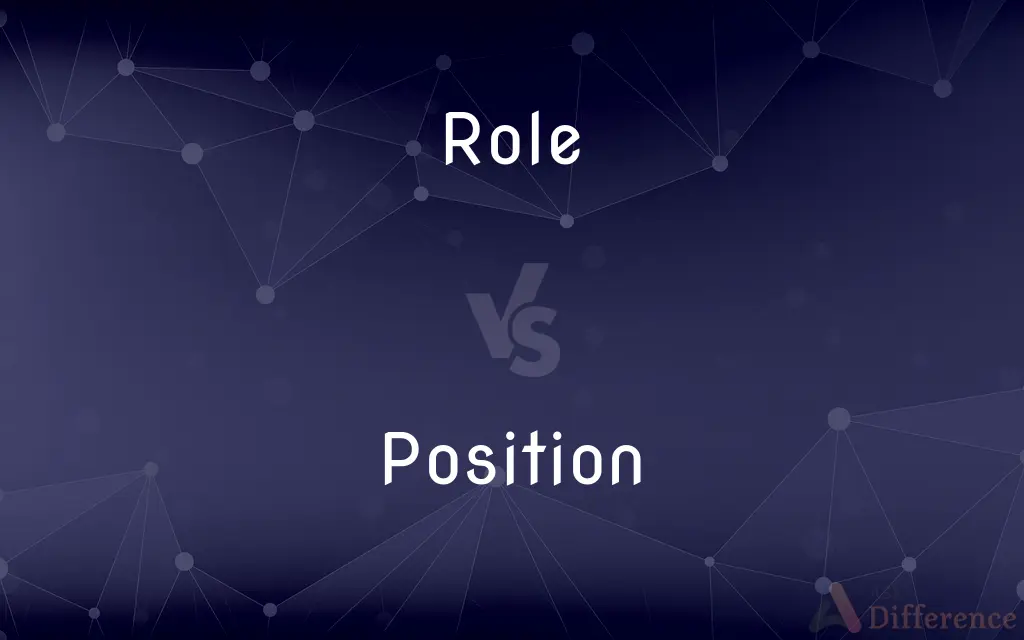Role vs. Position — What's the Difference?
By Maham Liaqat & Fiza Rafique — Updated on March 15, 2024
Role defines expected behaviors and responsibilities in a given context, focusing on actions and duties, while position denotes a rank or status within an organizational structure, emphasizing hierarchy.

Difference Between Role and Position
Table of Contents
ADVERTISEMENT
Key Differences
A role is about the part or character someone plays in a particular situation or system. It encompasses the duties, responsibilities, and expected behaviors associated with a specific function. Whereas, a position refers to a designated place within an organizational hierarchy or structure, often associated with a specific job title and rank.
Roles are defined by the actions and responsibilities taken on by an individual, which can vary widely even within the same position. For example, a teacher's role involves educating, mentoring, and guiding students. On the other hand, a position is more about the formal title or designation, such as 'Senior Teacher', which indicates a level of authority or status within an organization.
While roles focus on the functional aspects and contributions of an individual to a group or organization, positions highlight the formal structure and often come with defined powers or authority. A person in a leadership position, for instance, holds a rank that gives them certain decision-making powers.
Roles can be fluid and adaptable, changing based on the needs of a group or individual skills. In contrast, positions are usually more rigid, defined by organizational charts and job descriptions, and changes to them often require formal processes.
In teamwork or collaborative settings, understanding each member's role is crucial for effective cooperation and achieving common goals. Meanwhile, knowing the positions within an organization helps clarify the reporting relationships and decision-making hierarchy.
ADVERTISEMENT
Comparison Chart
Definition
The expected behavior and duties in a context
The rank or status within an organization
Focus
Actions and responsibilities
Hierarchy and title
Flexibility
Can be fluid and adaptable
Usually fixed and defined by the org chart
Importance
Defines how individuals contribute
Indicates authority and decision-making
Example Contexts
Teamwork, personal development
Organizational structure, job descriptions
Compare with Definitions
Role
The function assumed or part played by a person or thing in a particular situation.
In her role as manager, she is responsible for overseeing the project.
Position
A job title or rank within an organization.
She was promoted to the position of Chief Financial Officer.
Role
A set of behaviors expected from someone occupying a particular position.
His role in the team involves facilitating communication between departments.
Position
The location or arrangement of someone or something relative to others.
The company's position in the industry is strong, thanks to its innovative products.
Role
A character or identity taken on by someone.
He assumed the role of mediator during the negotiations.
Position
The manner in which someone or something is placed or arranged.
The position of the furniture in the room maximizes space.
Role
An actor's part in a play, film, etc.
She was cast in the leading role of the new Broadway musical.
Position
A situation or condition at a particular time.
The team's position in the league has improved significantly this season.
Role
The purpose or influence of someone or something in a particular context.
Education plays a crucial role in societal development.
Position
A point of view or attitude on a certain question.
The senator made his position on the issue clear during the debate.
Role
A role (also rôle or social role) is a set of connected behaviors, rights, obligations, beliefs, and norms as conceptualized by people in a social situation. It is an expected or free or continuously changing behavior and may have a given individual social status or social position.
Position
A place or location.
Role
Also rôle A character or part played by a performer.
Position
The right or appropriate place
The bands are in position for the parade's start.
Role
The characteristic and expected social behavior of an individual.
Position
A strategic area occupied by members of a force
The troops took up positions along the river.
Role
A function or position.
Position
The way in which something is placed
The position of the clock's hands.
Role
(Linguistics) The function of a word or construction, as in a sentence.
Position
The arrangement of body parts; posture
A standing position.
Role
A character or part played by a performer or actor.
My neighbor was the lead role in last year's village play.
Her dream was to get a role in a Hollywood movie, no matter how small.
Position
In ballet, any of the five arrangements of the arms and feet in which the legs are turned out from the pelvis.
Role
The expected behaviour of an individual in a society.
The role of women has changed significantly in the last century.
Position
An advantageous place or location
Jockeys maneuvering for position.
Role
The function or position of something.
Local volunteers played an important role in cleaning the beach after the oil spill.
What role does the wax in your earhole fulfill?
Position
A situation as it relates to the surrounding circumstances
In a position to bargain.
Role
Designation that denotes an associated set of responsibilities, knowledge, skills, and attitudes
The project manager role is responsible for ensuring that everyone on the team knows and executes his or her assigned tasks.
Position
A point of view or attitude on a certain question
The mayor's position on taxes.
Role
(grammar) The function of a word in a phrase.
Position
Social standing or status; rank.
Role
(object-oriented) In the Raku programming language, a code element akin to an interface, used for composition of classes without adding to their inheritance chain.
Position
A post of employment; a job.
Role
A part, or character, performed by an actor in a drama; hence, a part of function taken or assumed by any one; as, he has now taken the rôle of philanthropist.
Position
(Sports) The area for which a particular player is responsible.
Role
The actions and activities assigned to or required or expected of a person or group;
The function of a teacher
The government must do its part
Play its role
Position
The arrangement of the pieces or cards at any particular time in a game such as chess, checkers, or bridge.
Role
An actor's portrayal of someone in a play;
She played the part of Desdemona
Position
The act or process of positing.
Role
What something is used for;
The function of an auger is to bore holes
Ballet is beautiful but what use is it?
Position
A principle or proposition posited.
Role
Normal or customary activity of a person in a particular social setting;
What is your role on the team?
Position
A commitment to buy or sell a given amount of securities or commodities.
Position
The amount of securities or commodities held by a person, firm, or institution.
Position
The ownership status of a person's or institution's investments.
Position
To put in place or position.
Position
To determine the position of; locate.
Position
A place or location.
Position
A post of employment; a job.
Position
A status or rank.
Chief of Staff is the second-highest position in the army.
Position
An opinion, stand, or stance.
My position on this issue is unchanged.
Position
A posture.
Stand in this position, with your arms at your side.
Position
(figurative) A situation suitable to perform some action.
The school is not in a position to provide day-care after 4:00 pm.
Position
(team sports) A place on the playing field, together with a set of duties, assigned to a player.
Stop running all over the field and play your position!
Position
(finance) An amount of securities, commodities, or other financial instruments held by a person, firm, or institution.
Long position
Naked position
Position
(finance) A commitment, or a group of commitments, such as options or futures, to buy or sell a given amount of financial instruments, such as securities, currencies or commodities, for a given price.
Position
(arithmetic) A method of solving a problem by one or two suppositions; also called the rule of trial and error.
Position
(chess) The full state of a chess game at any given turn.
Position
(poker) The order in which players are seated around the table.
Position
To put into place.
Position
The state of being posited, or placed; the manner in which anything is placed; attitude; condition; as, a firm, an inclined, or an upright position.
We have different prospects of the same thing, according to our different positions to it.
Position
The spot where a person or thing is placed or takes a place; site; place; station; situation; as, the position of man in creation; the fleet changed its position.
Position
Hence: The ground which any one takes in an argument or controversy; the point of view from which any one proceeds to a discussion; also, a principle laid down as the basis of reasoning; a proposition; a thesis; as, to define one's position; to appear in a false position.
Let not the proof of any position depend on the positions that follow, but always on those which go before.
Position
Relative place or standing; social or official rank; as, a person of position; hence, office; post; as, to lose one's position.
Position
A method of solving a problem by one or two suppositions; - called also the rule of trial and error.
Position
To indicate the position of; to place.
Position
The particular portion of space occupied by a physical object;
He put the lamp back in its place
Position
A point occupied by troops for tactical reasons
Position
A way of regarding situations or topics etc.;
Consider what follows from the positivist view
Position
Position or arrangement of the body and its limbs;
He assumed an attitude of surrender
Position
The relative position or standing of things or especially persons in a society;
He had the status of a minor
The novel attained the status of a classic
Atheists do not enjoy a favorable position in American life
Position
A job in an organization;
He occupied a post in the treasury
Position
The spatial property of a place where or way in which something is situated;
The position of the hands on the clock
He specified the spatial relations of every piece of furniture on the stage
Position
The appropriate or customary location;
The cars were in position
Position
(in team sports) the role assigned to an individual player;
What position does he play?
Position
The act of putting something in a certain place or location
Position
A condition or position in which you find yourself;
The unpleasant situation (or position) of having to choose between two evils
Found herself in a very fortunate situation
Position
An item on a list or in a sequence;
In the second place
Moved from third to fifth position
Position
A rationalized mental attitude
Position
An opinion that is held in opposition to another in an argument or dispute;
There are two sides to every question
Position
The function or position properly or customarily occupied or served by another;
Can you go in my stead?
Took his place
In lieu of
Position
The act of positing; an assumption taken as a postulate or axiom
Position
Cause to be in an appropriate place, state, or relation
Position
Put into a certain place or abstract location;
Put your things here
Set the tray down
Set the dogs on the scent of the missing children
Place emphasis on a certain point
Common Curiosities
Can a role become a position?
In some cases, a role that becomes critical and well-defined within an organization can evolve into a formal position with a specific title.
Can a person's role change without changing their position?
Yes, a person's role can change based on project needs or personal development without a change in their formal position or title.
Is a position permanent?
Positions are usually more stable than roles but can change due to promotions, organizational restructuring, or changes in job description.
Can roles exist without formal positions?
Yes, roles can be informal and based on the dynamics of a group or situation, independent of formal job titles or positions.
How do companies define roles and positions?
Companies define roles through job descriptions and responsibilities, while positions are outlined in organizational charts and titles.
Is it possible to have a position without a clearly defined role?
While rare, it's possible, especially in newly created positions where the role may still be evolving.
Can volunteer work involve roles and positions?
Yes, volunteer work often involves roles defined by tasks and sometimes formal positions within the organizational structure of the volunteering entity.
Are roles more important than positions?
Both are important; roles focus on the contribution to tasks and goals, while positions define organizational structure and authority.
How are roles and positions communicated in an organization?
Organizations use job descriptions, organizational charts, and internal communications to clarify roles and positions.
Can someone have multiple roles within the same position?
Yes, individuals can assume multiple roles within a single position, depending on the tasks and responsibilities required.
How do roles and positions affect teamwork?
Understanding each team member's role ensures effective collaboration, while knowing their positions clarifies the decision-making hierarchy and authority.
Do roles and positions affect job satisfaction?
Yes, clarity and fulfillment in one's role and a well-defined position can significantly impact job satisfaction and performance.
How does culture influence roles and positions?
Organizational and societal cultures can shape the expectations and definitions of roles and positions, influencing behavior and interactions.
What role do roles and positions play in career development?
Understanding one's current role and aspiring to higher positions can guide professional growth, skill development, and career planning.
How do roles and positions interact in leadership?
Leadership involves both a formal position, which provides authority, and a role that includes guiding, motivating, and supporting others.
Share Your Discovery

Previous Comparison
Scarf vs. Scarve
Next Comparison
Fiance vs. GirlfriendAuthor Spotlight
Written by
Maham LiaqatCo-written by
Fiza RafiqueFiza Rafique is a skilled content writer at AskDifference.com, where she meticulously refines and enhances written pieces. Drawing from her vast editorial expertise, Fiza ensures clarity, accuracy, and precision in every article. Passionate about language, she continually seeks to elevate the quality of content for readers worldwide.














































